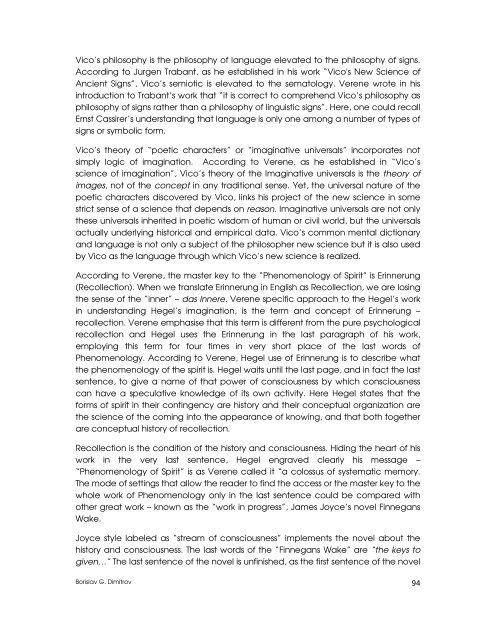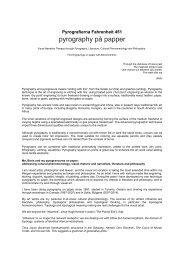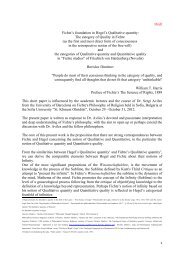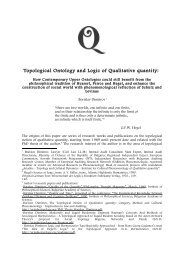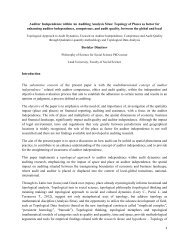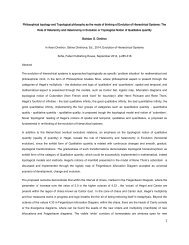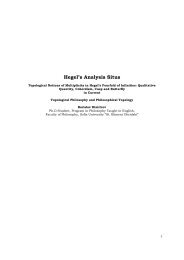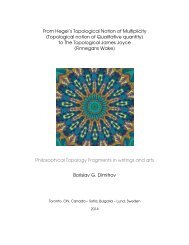o_194c354f0fne14b05mcimi6ppa.pdf
You also want an ePaper? Increase the reach of your titles
YUMPU automatically turns print PDFs into web optimized ePapers that Google loves.
Vico’s philosophy is the philosophy of language elevated to the philosophy of signs.<br />
According to Jurgen Trabant, as he established in his work “Vico's New Science of<br />
Ancient Signs”, Vico’s semiotic is elevated to the sematology. Verene wrote in his<br />
introduction to Trabant’s work that “it is correct to comprehend Vico’s philosophy as<br />
philosophy of signs rather than a philosophy of linguistic signs”. Here, one could recall<br />
Ernst Cassirer’s understanding that language is only one among a number of types of<br />
signs or symbolic form.<br />
Vico’s theory of “poetic characters” or “imaginative universals” incorporates not<br />
simply logic of imagination. According to Verene, as he established in “Vico’s<br />
science of imagination”, Vico’s theory of the Imaginative universals is the theory of<br />
images, not of the concept in any traditional sense. Yet, the universal nature of the<br />
poetic characters discovered by Vico, links his project of the new science in some<br />
strict sense of a science that depends on reason. Imaginative universals are not only<br />
these universals inherited in poetic wisdom of human or civil world, but the universals<br />
actually underlying historical and empirical data. Vico’s common mental dictionary<br />
and language is not only a subject of the philosopher new science but it is also used<br />
by Vico as the language through which Vico’s new science is realized.<br />
According to Verene, the master key to the “Phenomenology of Spirit” is Erinnerung<br />
(Recollection). When we translate Erinnerung in English as Recollection, we are losing<br />
the sense of the “inner” – das Innere. Verene specific approach to the Hegel’s work<br />
in understanding Hegel’s imagination, is the term and concept of Erinnerung –<br />
recollection. Verene emphasise that this term is different from the pure psychological<br />
recollection and Hegel uses the Erinnerung in the last paragraph of his work,<br />
employing this term for four times in very short place of the last words of<br />
Phenomenology. According to Verene, Hegel use of Erinnerung is to describe what<br />
the phenomenology of the spirit is. Hegel waits until the last page, and in fact the last<br />
sentence, to give a name of that power of consciousness by which consciousness<br />
can have a speculative knowledge of its own activity. Here Hegel states that the<br />
forms of spirit in their contingency are history and their conceptual organization are<br />
the science of the coming into the appearance of knowing, and that both together<br />
are conceptual history of recollection.<br />
Recollection is the condition of the history and consciousness. Hiding the heart of his<br />
work in the very last sentence, Hegel engraved clearly his message –<br />
“Phenomenology of Spirit” is as Verene called it “a colossus of systematic memory.<br />
The mode of settings that allow the reader to find the access or the master key to the<br />
whole work of Phenomenology only in the last sentence could be compared with<br />
other great work – known as the “work in progress”, James Joyce’s novel Finnegans<br />
Wake.<br />
Joyce style labeled as “stream of consciousness” implements the novel about the<br />
history and consciousness. The last words of the “Finnegans Wake” are “the keys to<br />
given…” The last sentence of the novel is unfinished, as the first sentence of the novel<br />
Borislav G. Dimitrov 94


